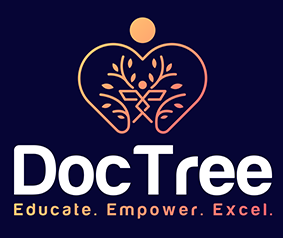THE BASICS OF MEDICAL RESUME WRITING
Medical resume writing can be nerve-racking. A white page or a white screen can intimidate even the best of writers. Questions like “Where to begin?,” “What do I include in it?,” or “What are my strengths?” and a hundred more pop up in the mind, leaving you stumped and at a loss. Sure, you can always search online for resume samples as a reference. You can even find templates you can use! But will that be enough?
With all these questions and uncertainties when writing your medical resume, there’s one thing that’s certain: DocTree. DocTree will help you with your medical resume writing by sharing with you the basics, and some tips and tricks so you can craft a compelling resume that underscores your strengths, highlights your achievements, and emphasises your skills as a healthcare practitioner. With our CV Review Program, you will have the skills to create the best medical resume that will let you clinch that interview.
But What Goes Into It?
For those not familiar with writing a medical CV, it usually contains the following information:
- o Personal Details
- o Medical Qualifications which include your registration number with AHPRA
- o Clinical Experiences with specific placements
- o Key Skills
- o Professional Affiliations
- o Achievements
- o Publications, if applicable
But How Detailed Can You Get?
Here’s a tip: for us in the healthcare profession, a longer resume will serve its purpose better than a shorter one. Do away with K.I.S.S. or keep it short and simple. Whether your resume is clear and concise, in the medical profession, details matter!
BUT even if you can be as detailed as you want, it’s the relevance of the information that’s important. You should focus on information that is relevant to the position you’re aiming for. That’s the key to medical resume writing. You customise your resume according to the institution or the position for which you are applying. You want the institution to know how you can be of value to them.
Focus on Quality
Here’s another tip: Focus on your achievements that have an impact on your career as a healthcare professional. While a longer medical resume may be great, irrelevant information stands out in a long medical resume like a sore thumb. Skills and training that you’ve excelled at can be included if they are relevant to the position. If you have publications and presentations that have been peer-reviewed and well-received by your peers, include them.
More Tips
For a strong medical resume, you’d be doing great if you keep it around 3 to 4 pages long. Clear headings and bullets will greatly help in terms of readability; font size matters too. As mentioned, your resume should be customised to the specific position or role you are after. And finally, proofread! Check for accuracy, spelling, formatting, and the like. A resume with no spelling errors indicates professionalism.
About DocTree
Responding to the needs of junior doctors, DocTree established a platform that allows these medical practitioners to have access to ongoing medical education wherever they are working in Australia, remote or otherwise. By being able to further their medical studies directly under leading medical specialist consultants, these junior doctors are provided with focused practice improvement opportunities that will benefit not only them but their patients as well.
Our commitment to offering consistent medical education to junior doctors regardless of geographic location has always been our guiding light. We strive to tap the best medical specialists across Australia to share their wisdom and knowledge with young doctors seeking to further improve their practice. Just like how a tree grows and spreads its branches, DocTree continues to grow and spread its wings with its growing service opportunities for medical practitioners.




